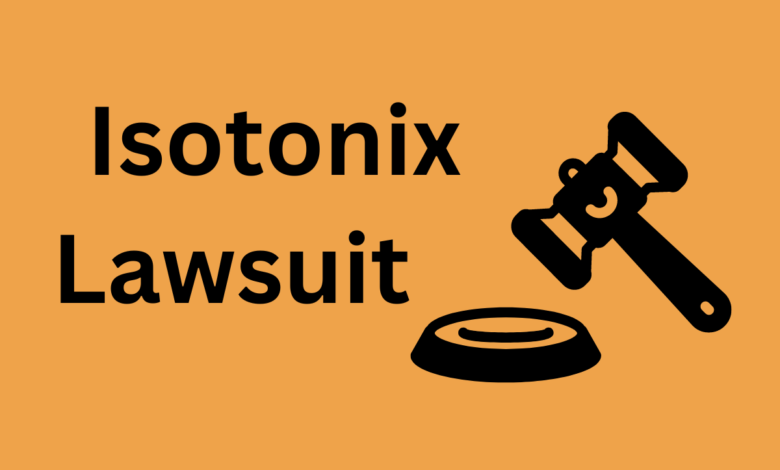The Truth Behind the Isotonix Lawsuit: What You Need to Know

The isotonix lawsuit wellness industry has seen an explosion in popularity over the last decade, with companies offering products that promise better health, increased energy, and overall well-being. Among these companies is Isotonix, a prominent name in the supplement world. However, recent legal issues have brought the brand under scrutiny. In this article, we delve into the details of the Isotonix lawsuit, its implications, and what it means for consumers and the wellness industry.
1. Background of Isotonix
1.1 Company Overview
Isotonix, a brand owned by Market America, has built its reputation on a range of wellness supplements touted for their isotonic delivery system. This unique selling point claims to enhance nutrient absorption by mirroring the body’s natural fluid composition. Over the years, Isotonix has gained a loyal customer base, particularly among individuals seeking convenient and effective health solutions.
However, as the company grew, so did questions about its business model and product claims. The wellness industry is notorious for its lack of stringent regulations, which often leads to exaggerated marketing. Isotonix has not been immune to these criticisms, making its products and practices a topic of heated debate.
1.2 The Rise of Multivitamins and Wellness Products
The increasing awareness of health and fitness has fueled a booming demand for supplements. Consumers are eager for products that promise quick results, leading to a surge in brands like Isotonix. While this trend has benefited the industry, it has also attracted scrutiny, as not all products meet the standards they advertise.
1.3 Early Controversies and Legal Challenges
Before the current lawsuit, Isotonix and its parent company faced minor allegations related to their marketing strategies and pricing. While these issues did not escalate significantly, they set the stage for the larger legal challenges the company faces today.
2. Details of the Isotonix Lawsuit
2.1 Origin of the Lawsuit
The Isotonix lawsuit emerged from growing dissatisfaction among consumers and watchdog organizations. Allegations were first raised in 2023 when a group of plaintiffs accused the company of misleading advertising and unethical business practices. These complaints centered on claims that Isotonix exaggerated the efficacy of its products without sufficient scientific backing.
Additionally, concerns were raised about its business model, which some critics labeled as a pyramid scheme due to its reliance on independent distributors to recruit more sellers. This aspect added another layer of complexity to the legal proceedings.
2.2 Core Allegations
The lawsuit outlines several key allegations against Isotonix:
- False Advertising: Claims that Isotonix overstated the benefits of its products without adequate clinical evidence.
- Deceptive Marketing: Use of testimonials and promotional materials that may mislead consumers.
- Questionable Business Practices: Allegations that the company’s multi-level marketing structure prioritizes recruitment over product sales.
These allegations sparked debates about the ethics and legality of wellness industry practices.
2.3 Legal Proceedings and Updates
The lawsuit has progressed through various stages of the legal system. While Isotonix has denied all allegations, claiming its practices are ethical and its products effective, evidence presented by the plaintiffs continues to challenge these assertions. As of now, no final verdict has been reached, but the case has drawn widespread attention from legal and consumer rights communities.
3. Implications of the Lawsuit
3.1 For Consumers
Consumers are directly impacted by the Isotonix lawsuit, as it raises serious questions about product transparency and safety. Those who rely on supplements for their health may feel betrayed by the possibility that claims were exaggerated. Additionally, the case underscores the importance of verifying product efficacy and safety before purchasing.
3.2 For the Wellness Industry
The lawsuit serves as a wake-up call for the wellness industry. With a growing number of companies entering the market, stricter regulations are needed to ensure that products are safe and claims are backed by science. This case highlights the consequences of prioritizing marketing over ethical practices, potentially reshaping how businesses operate.
3.3 Financial and Reputational Impact on Isotonix
The financial repercussions of the lawsuit could be significant for Isotonix. Sales may decline as consumer trust erodes, and the company could face substantial legal penalties if found guilty. Additionally, its reputation as a leading wellness brand is at stake, which could affect its long-term viability.
4. Lessons and Preventative Measures
4.1 How Consumers Can Protect Themselves
Consumers must take proactive steps to safeguard their health and finances. Before purchasing wellness products, research the company’s claims, check for third-party certifications, and read independent reviews. Avoid relying solely on marketing materials, as these can be misleading.
4.2 Accountability in the Wellness Industry
This lawsuit highlights the need for greater accountability within the wellness industry. Regulatory bodies should enforce stricter guidelines for product claims and advertising. Brands must also prioritize transparency, ensuring that consumers can trust the products they purchase.
Conclusion
The Isotonix lawsuit is more than just a legal battle; it’s a reflection of broader issues within the wellness industry. For consumers, it’s a reminder to be cautious and informed when choosing supplements. For companies, it’s a call to prioritize ethical practices and transparency.
While the case is still unfolding, its impact is already being felt. Whether isotonix lawsuit emerges unscathed or faces significant penalties, this lawsuit will likely influence how the wellness industry operates moving forward.


